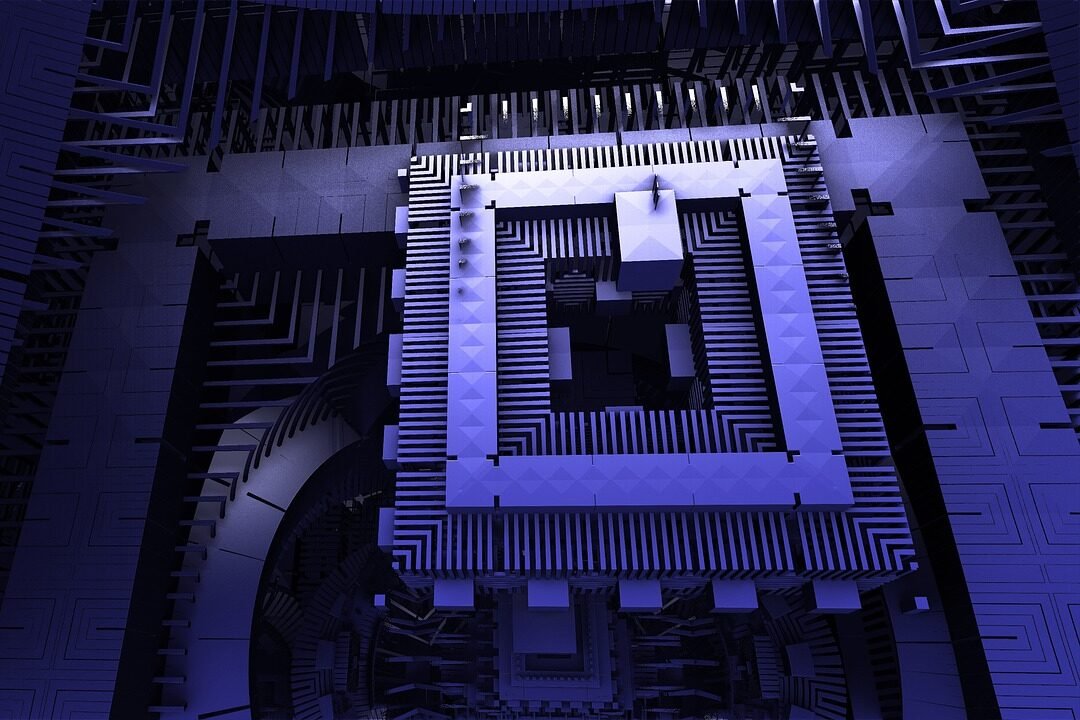1. Quantum Computers Just Broke Crypto’s “Unhackable” Reputation

Remember when everyone said blockchain was practically unhackable? Well, quantum computing just entered the chat, flipped the table, and laughed. Imagine waking up to check your crypto wallet and finding it empty—not because of phishing scams, but because quantum computers casually sliced through encryption that was supposed to last centuries. Blockchain’s cryptographic methods rely on puzzles so complex that regular computers need more time than the universe’s lifespan to solve them. But quantum computers? They handle these puzzles effortlessly, as if they’re solving a crossword over morning coffee.
The power behind quantum computers is their ability to be everywhere at once—solving countless possibilities simultaneously. Think of blockchain encryption as a safe locked by an impossible math puzzle. Traditional computers pick away at it slowly, like a nervous thief fumbling in the dark. Quantum computers stroll right up and crack it wide open without breaking a sweat. Suddenly, the digital vault holding your crypto seems more like a piggy bank than Fort Knox. The implications are startling: every wallet, transaction, and crypto asset once considered impenetrable is now vulnerable. Blockchain enthusiasts who felt invincible just found out they’re standing on very thin ice.
2. The Quantum Supremacy Nightmare Is Real
Quantum supremacy sounds like something straight out of Star Trek, doesn’t it? Unfortunately for blockchain, it’s not sci-fi anymore—it’s reality. Quantum supremacy simply means quantum computers outperform classical supercomputers by such a wide margin, it’s not even a contest. Imagine racing Usain Bolt, except he’s riding a motorcycle—that’s quantum supremacy. This leap in computing power turns blockchain’s complicated cryptography into child’s play.
Blockchain relies heavily on cryptographic methods designed to keep your transactions private and secure. But quantum computers effortlessly unravel these methods using quantum principles that regular computers can’t even comprehend. Imagine your carefully encrypted crypto wallet becoming transparent overnight, like discovering your bedroom walls are suddenly made of glass. Crypto experts are now nervously brainstorming new encryption methods, racing against quantum machines that are already warming up. Blockchain’s security no longer feels sturdy—it feels like paper waiting for quantum scissors. Quantum supremacy isn’t theoretical anymore; it’s here, it’s now, and it’s making blockchain experts sweat buckets.
3. Shor’s Algorithm Just Ruined Blockchain’s Day
You probably haven’t heard of Peter Shor—but trust me, blockchain developers have his name burned into their brains. Shor’s Algorithm is quantum computing’s secret weapon designed specifically to break down the cryptography blockchain uses daily. Picture blockchain encryption as a puzzle so tangled, it’d take regular computers thousands of years to solve. Shor’s algorithm slices through this puzzle in mere seconds, leaving blockchain security looking embarrassingly weak.
Blockchain’s defenses rest on cryptographic methods like RSA and elliptic curve cryptography, both previously seen as bulletproof. But now, quantum computers equipped with Shor’s algorithm can factorize those impossibly large numbers like they’re cracking peanuts. Imagine realizing the complex lock protecting your front door can now be picked with a toothpick. That’s exactly how blockchain experts feel right now. Everyone who thought crypto was the future is scrambling to rethink security before quantum machines arrive en masse. Shor’s algorithm isn’t just a theoretical threat—it’s the ghost haunting blockchain’s dreams.
4. Private Keys Just Got Quantum Hacked
Ever carefully hide your private crypto key thinking, “No hacker could guess this”? Quantum computing just smirked and said, “Watch me.” Your private key is essentially a mathematical code so complicated that classical computers can’t realistically crack it. But quantum computers don’t just crack codes—they eat them for breakfast. They factor enormous numbers rapidly, making your crypto wallet’s private key as secure as a Post-It note stuck to your laptop.
The horror scenario: you check your crypto wallet to find the balance is zero—not from any scam, but from quantum-powered theft. The same encryption that protected millions suddenly feels ridiculously outdated. Crypto holders everywhere are realizing their digital wealth might soon become quantum prey. What felt like safeguarding your money in a high-security vault now feels like keeping cash under your welcome mat. Quantum computing has turned blockchain’s security promises upside-down, leaving wallets feeling worryingly exposed. In the quantum world, your private keys aren’t private anymore—they’re just easy pickings.
5. Quantum Computing Made Bitcoin Mining Look Easy

Remember the crazy energy consumption associated with Bitcoin mining—entire warehouses filled with humming, overheated machines? Quantum computers just rolled their eyes at that entire concept. Bitcoin’s security relies on Proof-of-Work puzzles, tough problems designed specifically to slow miners down. But quantum computers solve these puzzles effortlessly, like finishing a Rubik’s Cube in seconds rather than days.
Imagine blockchain as a giant game of Monopoly, where classical miners have been slowly rolling dice, moving one square at a time. Quantum computing just landed on Boardwalk and Park Place simultaneously. If quantum computers start mining cryptocurrencies, they’ll easily dominate networks, controlling transactions and rewriting digital history at will. Bitcoin’s foundational security principle—expensive computational effort—is suddenly meaningless. Blockchain’s entire ecosystem could become vulnerable to manipulation by anyone holding quantum computing power. Bitcoin mining suddenly looks less like digital gold mining and more like quantum-powered monopoly.
6. Quantum Hackers Could Rewrite Blockchain History
Blockchain’s big claim to fame? An unchangeable record of every transaction ever. Quantum computers, however, might soon scribble all over blockchain’s clean pages. Imagine blockchain as a ledger written in permanent ink. Quantum computers just walked in with an eraser. By controlling mining operations with ease, quantum hackers could rewrite transaction histories, double-spend coins, or even erase entire financial records.
The implications are chilling. Imagine waking up to find your last five years of crypto transactions vanished or altered. The blockchain would no longer represent reality—just whatever quantum hackers decided it should show. Crypto enthusiasts who’ve relied on blockchain’s immutability for trust suddenly find their world shifting uncomfortably beneath their feet. Quantum computing doesn’t just break blockchain security—it threatens blockchain’s very identity as a reliable record. What was once blockchain’s biggest strength just became its greatest vulnerability.
7. Smart Contracts Just Got Outsmarted by Quantum Tech
Smart contracts were supposed to automate trust—imagine legal agreements enforced flawlessly by code. Quantum computing just showed up and crashed that party spectacularly. Smart contracts rely on cryptography that quantum computers can unravel effortlessly. Imagine your perfectly executed digital deal suddenly sabotaged by quantum-powered hacks, funds draining instantly from your account.
Previously, trusting smart contracts felt safe, predictable, even futuristic. But with quantum hackers in play, the reliability of smart contracts evaporates. Instead of feeling futuristic, they now feel frighteningly fragile. Crypto investors who trusted smart contracts to handle billions suddenly face quantum vulnerabilities. Blockchain’s smart contracts, the once-celebrated solution to human error, just got blindsided by quantum innovation. Quantum technology hasn’t just challenged blockchain—it’s threatening to dismantle blockchain’s entire promise of secure automation.
8. Quantum Attacks Could Trigger Crypto Chaos
Imagine blockchain security like a delicate Jenga tower: remove the wrong piece, and the whole structure collapses. Quantum computing might soon pull that piece, sending crypto into chaos. Quantum-powered attacks could simultaneously target wallets, exchanges, and blockchain networks, causing panic selling, crashing prices, and triggering economic shockwaves. Crypto’s stability rests entirely on trust—and quantum attacks could annihilate trust overnight.
The fear isn’t theoretical: blockchain developers are already imagining nightmare scenarios where quantum computers sweep in, trigger massive sell-offs, and create global panic. The delicate crypto economy suddenly feels terrifyingly vulnerable. Crypto holders would wake up to plunging values and irreversible losses. The crypto market could become quantum’s playground, manipulated at whim. Blockchain’s reassuringly stable structure might soon feel like a house of cards, easily toppled by quantum gusts.
9. Quantum Computers Could De-anonymize Your Crypto Transactions
Crypto promised anonymous transactions—financial privacy finally achieved. Quantum computing, however, just became blockchain’s nosy neighbor. Quantum computers could de-anonymize blockchain transactions easily, connecting wallets to real-world identities within moments. Imagine believing your crypto purchases were private, then realizing quantum tech can track you effortlessly.
This quantum invasion isn’t just inconvenient—it undermines blockchain’s fundamental promise of privacy. Crypto holders who value anonymity suddenly find quantum computing peeking over their shoulder. Quantum’s arrival could change blockchain from privacy paradise to surveillance nightmare. Blockchain’s anonymity, once rock-solid, just melted away under quantum’s gaze.
10. Quantum Tech Could Make Crypto Exchanges Sitting Ducks

Ever traded crypto confidently on your favorite exchange, feeling secure behind layers of passwords and two-factor authentication? Quantum computers just looked at that setup and chuckled. Crypto exchanges safeguard billions of dollars in digital assets, relying on encryption methods quantum machines can shred with ease. Imagine logging in one day to find your account emptied—not by hackers, but by quantum-powered algorithms effortlessly bypassing security gates you thought were impenetrable. Quantum attacks could cripple entire exchanges overnight, triggering panic withdrawals and chaos across crypto markets. Remember when Mt. Gox collapsed, causing shockwaves across crypto communities?
Quantum computing could recreate that disaster—but faster, broader, and far more devastating. Users would scramble desperately, hoping their funds survived the quantum tsunami. Exchanges, once bustling with activity, would suddenly look like ghost towns filled with empty wallets and dashed dreams. Suddenly, those lengthy passwords and authenticator apps seem laughably inadequate, like padlocks on a cardboard box. Quantum computing didn’t just breach exchanges—it shook confidence in the entire crypto trading system, reminding everyone just how fragile digital security really is.
11. Quantum Could Sabotage Crypto’s Future Adoption
Blockchain promised a decentralized financial revolution—crypto wallets for everyone, everywhere. Quantum computing, however, just became blockchain’s ultimate spoiler. Imagine trying to convince your skeptical friends to adopt crypto when quantum computers threaten its security. It’s like pitching an amazing new house, except the front door doesn’t lock properly and burglars already know about it. Quantum threats could halt crypto adoption dead in its tracks, making investors nervous, regulators wary, and the general public skeptical.
Instead of rushing into crypto, potential adopters might pause, wondering if quantum’s looming shadow makes crypto more risk than reward. Crypto startups would struggle to attract new users, investors would grow skittish, and blockchain projects could stall in uncertainty. Crypto’s bright future, once so certain, now looks clouded with quantum doubt. What once felt revolutionary now feels risky, leaving blockchain’s grand dreams hanging by a thread. Quantum computing hasn’t just cracked blockchain’s security—it might’ve put crypto’s entire future on hold.
12. Quantum Threats Are Sparking a Blockchain Arms Race
Ever watch a sci-fi movie where advanced technology sparks a frantic race for superiority? Welcome to blockchain’s quantum edition. The emergence of quantum computing has triggered an urgent arms race among blockchain developers scrambling to protect digital assets. Think of crypto experts huddled anxiously, furiously coding new quantum-resistant cryptography in a desperate bid to stay ahead.
Blockchain platforms are racing against quantum’s ticking clock, hoping to deploy quantum-proof encryption before disaster strikes. It feels like a tech-driven Cold War, with crypto projects nervously eyeing quantum labs, each new breakthrough heightening anxiety. Developers are exhausted, investors edgy, and communities restless, wondering if blockchain can outrun quantum’s relentless pursuit. Suddenly, blockchain innovation isn’t leisurely—it’s a desperate sprint to survival. Crypto enthusiasts who once calmly debated theoretical vulnerabilities now scramble for quantum-proof lifeboats. Quantum computing hasn’t just introduced new threats—it’s turned blockchain innovation into a high-stakes race with no room for second place.
13. Quantum-Resistant Blockchain Might Be Crypto’s Only Hope
Despite quantum’s terrifying threats, blockchain isn’t necessarily doomed—it just got pushed into an urgent reinvention. Quantum-resistant blockchain technologies could become crypto’s lifeline, offering cryptographic methods even quantum machines struggle to crack. Imagine blockchain developers crafting ingenious new systems, essentially quantum-proof digital fortresses protecting crypto’s future. Quantum-resistant cryptography uses different mathematical puzzles—ones quantum computers haven’t yet mastered. It’s blockchain’s counter-move in this high-stakes chess match with quantum computing. Crypto users could regain trust, exchanges rebuild confidence, and blockchain projects find stable footing again.
Picture blockchain communities breathing a collective sigh of relief, knowing quantum’s fury has finally met its match. The challenge? Blockchain must embrace quantum-resistant tech quickly, decisively, and universally. The next crypto breakthrough won’t just be flashy—it’ll be essential survival gear. Quantum-resistant blockchain isn’t just promising—it’s absolutely necessary, offering crypto’s best chance to thrive in the quantum era. Blockchain’s future hinges entirely on outsmarting quantum’s relentless threat, transforming crypto’s biggest crisis into its greatest triumph yet.
